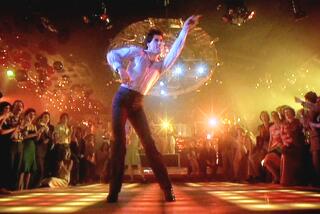Where Woodstock, Hendrix Have Not Been Forgotten
- Share via
Ed Adair stands within the narrow interior of the former Heads & Highs, surrounded by a panoply of posters--voluptuous women, winged motorcycle insignias and rock stars from a time long past. Somewhere, incense is burning. Black lights glow. The deep beat of Jimi Hendrix’s guitar underscores the scene.
“It’s 1967 in here and it’s 1986 out there,” Adair says. The Van Nuys store is a kind of ghost tucked in among the discount appliance stores, tire outlets and motorcycle fix-it shops on Van Nuys Boulevard.
After 18 years in business, new attitudes and laws have changed the store’s name. But Adair, who manages the store, still wears his hair in a long ponytail down his back, though it is mostly gray.
“Ed’s H & H, that’s the name now,” he says. He pulls the Woodstock album off the shelf behind him. Its edges are frayed, its cover faded. But Richie Havens, Joan Baez and Hendrix sing off the old plastic as clear as can be.
Like it or not, Ed’s H & H has character. There can’t be many places left where you can find a coloring book called “Watergate by the Numbers,” in which Richard M. Nixon’s face is a connectable constellation of dots.
A regular at Heads & Highs stops in at Ed’s H & H. His name is Larry Christ, he says. He’s traveling “the world” by motorcycle, although it is up for repairs in Venice at the moment. He was “walking through” the area with his traveling companion, Gregg Christ. They are the Christ brothers, part of a brotherhood in which everyone’s last name is Christ.
‘Physically, 31’
How old is he, Larry Christ is asked. “Physically, 31,” he says.
Otherwise? “Spiritually, I think about 2,000 years, brother.”
Another regular, Terry, wanders in and out of the store. He has stringy blond hair and a wide, toothless grin. Terry, who cannot talk, uses sign language to express himself. “Oh, he sleeps out behind the store,” Adair says. “He just gets by as best he can get by.”
David Silverman is 22, physically and in every other way. The son of the store’s owner, Irving Silverman, bounds in wearing a Cincinnati Reds cap. He says he is studying economics at UCLA.
“Now, I think the crowd is more diverse,” he says of the shop’s clientele. “In the ‘60s, and around then, they were hippies. Now it’s everybody.”
What does he remember of the 1960s? “I was born in 1963,” he says. “So I can remember some.”
Like what?
“I can remember when my dad first bought this store. I remember that. It was 1969. I was 6 years old.”
So he really can’t remember much, right?
“I guess not.”
But Adair remembers.
‘We Dropped Out’
“Those people are still out there,” he says. “All those people, you know. They just lost hope. The thing with the ‘60s was we talked too much about dropping out. So we dropped out. It was a big mistake. We left the door wide open for the lawmakers to make the laws in their favor.”
Joan Baez finishes a song called “Drug Store Truck Drivin’ Man,” and Adair carefully lifts the Woodstock record off the machine and slips it into the cover, which shows a man and a woman wrapped in a blanket. He looks at the picture.
“See that?” he asks.
“Oh, the ‘60s,” he says. “Those were the days.”
More to Read
The biggest entertainment stories
Get our big stories about Hollywood, film, television, music, arts, culture and more right in your inbox as soon as they publish.
You may occasionally receive promotional content from the Los Angeles Times.










